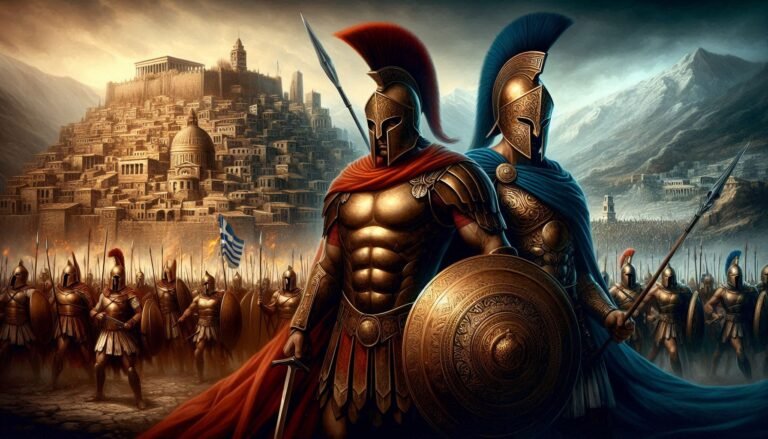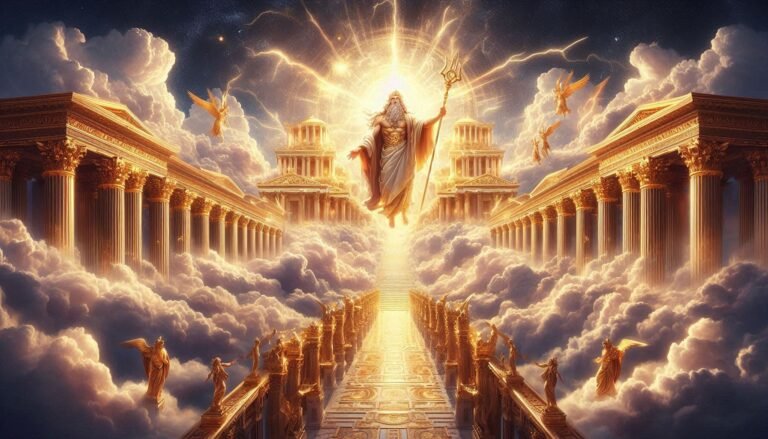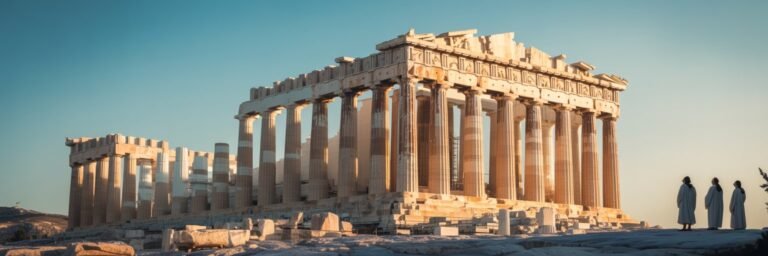INTRODUCTION
In the vast tableau of history, the Classical period of Ancient Greece (500-323 B.C.) shines brightly, harboring pivotal changes in art, politics, and culture. The era—regnant with great thinkers, creators, and leaders—nurtured immense progress in human civilization. Of these figures, few are as influential as the leaders who emerged during this epoch: Pericles, Socrates, Alexander the Great. Their extensive contributions not only shaped their contemporaries but continue to resonate through the corridors of time. The narrative of these leaders evokes vivid tales of triumph, tragedy, and transcendence.
HISTORICAL BACKGROUND
Astor of this narrative, Pericles, was a prominent statesman and general of Athens. Guiding the city-state from 461 B.C. to 429 B.C., he championed the ideals of democracy and brought forth the ‘Golden Age’ of Athens. His tenure witnessed the completion of iconic structures, such as the Parthenon, laying the blueprint for Western architecture.
Socrates, another Athenian, was the quintessential philosopher, choosing public discourse over political power. Choosing the marketplace as his platform, he imparted wisdom through provocative questioning, creating the Socratic Method—a teaching template, still operating in classrooms today. His ideas have permeated through time, seeding Western philosophical thought.
Finally, Alexander the Great, born in 356 B.C., was the king of Macedonia who conquered an empire stretching from Greece to Egypt to India. His military genius paralleled his audacious spirit for exploration, leaving a mark even after his untimely death at age 32.
THEORIES AND INTERPRETATIONS
Historians have offered myriad interpretations of these notable leaders’ lives and legacies.
Some laud Pericles for championing democracy, while others paint him as an autocrat under a democratic veneer, exploiting public funds for Athenian expansion, alienating allies, and ushering in the ruinous Peloponnesian War. However, their shared agreement lies in acknowledging his pivotal efforts in making Athens the heart of Greek civilization.
In the case of Socrates, considered one of the founders of Western philosophy, he has always been wrapped in controversy. His public demonstrative discourses drew admirers and critics, consequently leading to his trial and execution. Modern scholars have worked tirelessly to divorce Socrates from Plato—his student whose writings serve as the principal source of his philosophy—piecing together a version less a man with answers and more an instigator of challenging questions.
Alexander, despite his youth, exhibited unparalleled ambition and cunning on the battlefield. Some scholars perceive him as a ruthless, power-hungry autocrat. Others view him as a visionary compelled by his deep love for cosmopolitanism and knowledge. Controversies regarding his death—whether categorized as natural, intoxication, or poison—add further colour to his contentious narrative.
MYSTERIES AND CONTROVERSIES
Classical Greece harbours its fair share of mysteries and controversies.
For Pericles, the plague in Athens represented a low point in his leadership. His own death amidst the plague adds speculation to his legacy. Was he a martyr of Athens, or an overreaching leader with ambitious policies that cost him his life?
Socrates’ trial and execution bring about questions of political persecution and freedom of speech. Was he truly guilty of corrupting Athens’ youth, or was he maligned because he threatened the status quo with his thought-provoking questions?
For Alexander, controversy lies posthumously. Although his body was mummified, his tomb’s location eludes historians. His vast empire, divided among generals, battled for control, illustrating the aftermath of a leadership vacuum left by a man of such indomitable will.
SYMBOLISM AND CULTURAL SIGNIFICANCE
Pericles’s Parthenon represented Athenian supremacy, a reminder of the city’s democratic values and artistic excellence. The Age of Pericles came to symbolize humanism, as it prized individual thought and scientific inquiry.
Socrates’ teachings, notoriously challenging the accepted wisdom of his contemporaries, heralded free thought. His sacrifice in favor of his principles makes him a symbol of intellectual martyrdom.
Alexander’s achievements captured the limitless spirit of human endeavour, symbolizing dynamism and empire-building. His empire remains one of the earliest and deepest imprints of cultural globalization.
MODERN INVESTIGATIONS
Modern research strives to bridge gaps, correct inaccuracies, and flesh out these iconic figures’ narratives. Recent archaeological excavations in Athens aim to understand better the Periclean Age. Technological advancements aided in deciphering ancient inscriptions about Socrates, enabling historians to comprehend his philosophies more comprehensively.
Unraveling Alexander’s influence, scientists use genetic studies to trace the Macedonian’s impact on the population. The scientific quest to locate Alexander’s tomb continues as more artifacts and historical sites are discovered.
LEGACY AND CONCLUSION
These leaders’ legacies extend far beyond their lifetimes and their geographical boundaries. They echo in every hall of power, in every place of learning, and in every audacious human endeavour. Pericles’ democratic spirit, Socrates’ relentless pursuit of wisdom, and Alexander’s unyielding ambition serve as torchbearers of human progress, lighting the path for future generations.
The golden threads of their narratives are woven into the broader fabric of human history, imbuing it with the vibrancy of their leadership, the power of their ideas, and the indomitable spirit of their will. Their tales yet continue to inspire, tantalize, and provoke query from historians and laymen alike – cementing their position as some of the greatest leaders in antiquity and beyond.





